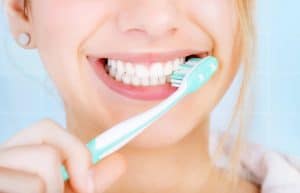 Most people know, at least to some degree, that good dental hygiene is important. We’ve been taught that most of our lives, and for a majority of us, we’ve experienced the consequences of not keeping up with good hygiene by needing treatment for a dental health concern (like a cavity). However, despite knowing it intellectually, it’s often easy to forget just how intrinsic a good hygiene routine is to the concept of good dental health in general. That can make it easy to prioritize good hygiene less than we should, and as a result, experience issues like cavities more often than need be.
Most people know, at least to some degree, that good dental hygiene is important. We’ve been taught that most of our lives, and for a majority of us, we’ve experienced the consequences of not keeping up with good hygiene by needing treatment for a dental health concern (like a cavity). However, despite knowing it intellectually, it’s often easy to forget just how intrinsic a good hygiene routine is to the concept of good dental health in general. That can make it easy to prioritize good hygiene less than we should, and as a result, experience issues like cavities more often than need be.
You stay ahead of common dental threats
Some of the most common threats to affect people’s dental health can also become some of the most significant ones. For example, gingivitis is common when you don’t brush and floss along your gum line properly, or neglect to visit your dentist often enough. In fact, it affects about 80% of adults to some degree. Gingivitis is also the first stage of gum disease, and in its severe form, it becomes the leading cause of adult tooth loss. When you practice good hygiene every day, including cleaning especially well along your gum line, you can largely prevent the bacteria buildup that leads to such concerns.
You can avoid things like aching teeth
Losing teeth is an extreme result of a common condition, though it is an important one to prevent. More commonly, though, issues such as weakened tooth enamel or the formation of a cavity can cause your tooth (or teeth) to grow increasingly more sensitive over time. These are also the result of excess oral bacteria buildup, and therefore, can also be prevented by keeping up with a consistently good hygiene routine A part of that routine should also include visiting your dentist at least once every six months for a checkup and cleaning appointment, during which you’re more likely to detect the cause of a toothache and treat it long before it gets serious.
You’re less likely to need dental treatment
Dental checkups and cleanings should be routine for everyone, but other forms of dental treatment are typically reserved for addressing specific concerns that develop with your oral health. For example, you won’t need a filling unless you develop a cavity. You won’t need root canal treatment unless the tooth decay becomes more severe, and so on. When you keep up with good hygiene practices, you’re less likely to develop such issues, and consequently, you’re less likely to need treatment in addition to your regular dental checkups and cleanings.
Learn if your hygiene is good enough
Keeping your smile consistently healthy isn’t usually difficult. It just takes a consistently good hygiene routine and a strict schedule of preventive dental care. To learn more, schedule an appointment by calling Peddicord Family Dentistry in Ankeny, IA, today at (515) 963-3339. We also proudly serve patients of all ages who live in Bondurant, Polk City, Elkhart, Alleman, Cambridge, and all surrounding communities.



